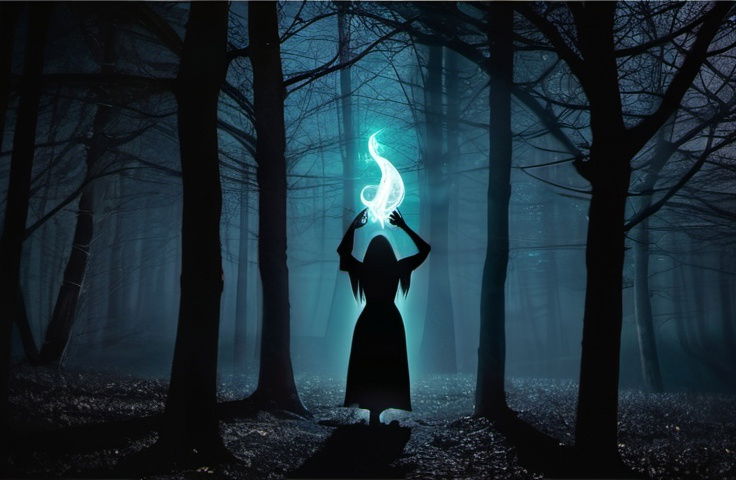A new study of people with differing paranormal beliefs found that those who held traditional paranormal beliefs like witchcraft experienced more feelings of stress and less ability to cope with stress than those who had more new-age paranormal beliefs.
Within the study’s context, “new-age beliefs” included individual concepts like psychic phenomena (psi), spiritualism, and precognition (belief in the ability to foresee the future). According to the study authors, the connection lies in the feeling of control that individualized paranormal beliefs like precognition offer over traditional paranormal belief systems like witchcraft, which put the control of one’s destiny in the hands of external forces.
“TPB (Traditional Paranormal Belief) was significantly predictive of higher Distress and lower Coping,” they write, while also noting that “NAP (New Age Philosophy) was neither predictive of Distress nor Coping.”
“These findings support the notion that TPB is attendant with external control, particularly the notion that unknown supernatural forces/powers influence existence,” the study’s authors add.
Traditional Religions, Paranormal Beliefs & Witchcraft
Led by Kenneth Drinkwater, Ph.D., of Manchester Metropolitan University, U.K., the study team examined the history of paranormal beliefs, including traditional religious beliefs, new-age paranormal beliefs, and witchcraft, to see if there were previous associations with stress management and coping.
According to the authors, that analysis found that there was no recognized overall link between stress management and any form of paranormal beliefs. They did, however, find some studies linking different paranormal beliefs to varying stress management outcomes.
“Recent research indicates that paranormal belief, in the absence of allied cognitive-perceptual and psychopathology-related factors, is not associated with negative well-being outcomes,” they write. “However, investigators have historically reported relationships between specific facets of belief (e.g., superstition) and stress vulnerability.”
Still, most previous studies used a questionnaire known as the Revised Paranormal Belief Scale. Designed to measure correlations between paranormal beliefs, stress, and coping, the questionnaire has been questioned due to potential statistical inaccuracies.
Drinkwater and colleagues employed a tool known as the Rasch purified Revised Paranormal Belief Scale to combat those shortcomings. According to the press release announcing the team’s findings, this revised questionnaire “aims to improve on the earlier scale,” thereby improving the accuracy of any connections found.
Specifically, the revised scale separates beliefs into two distinct subcategories based on whether or not that belief system provides a sense of control. The first, Traditional Paranormal Belief (TPB), offers less control, while the second, New Age Philosophy (NAP), offers more.
“These are operationalised in terms of function,” the researchers write. “Specifically, whether belief provides a sense of control at the social (TPB) or individual level (NAP).”
Revised Questionnaire Finds Links Between Stress and Control
After asking 3,084 people to complete the questionnaire, the team studied the results for patterns. The answers were also supplemented with a 10-item Perceived Stress Scale (PSS-10) questionnaire completed by the study volunteers. By comparing the two, the researchers were looking to see how the perceived sense of control within differing paranormal beliefs would affect the amount of stress a believer experiences and how much success they have coping with feelings of stress. As hoped, they saw a distinct pattern.
First, the researchers found that people who believed in traditional paranormal beliefs like witchcraft had higher levels of stress than usual. This group also reported more difficulty managing feelings of stress than usual.
Conversely, the people who had paranormal beliefs that were more individualized and therefore offered more direct control reported no increased feelings of stress. They also showed no increased difficulties in coping with those feelings. While inconclusive, the study authors write that “these findings support the notion that TPB is attendant with external control, particularly the notion that unknown supernatural forces/powers influence existence.”
“However, additional research is still needed if we are to further explore these fascinating relationships in connection to perceived stress, well-being, and coping styles,” they conclude.
The study “Re-evaluation of the relationship between paranormal belief and perceived stress using statistical modelling” was published in PLOS ONE.
Christopher Plain is a Science Fiction and Fantasy novelist and Head Science Writer at The Debrief. Follow and connect with him on X, learn about his books at plainfiction.com, or email him directly at christopher@thedebrief.org.

